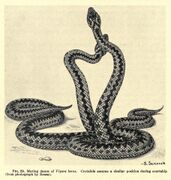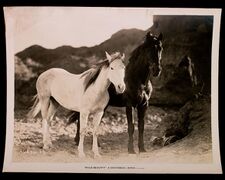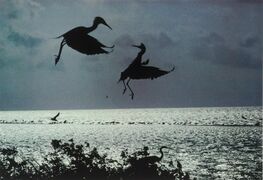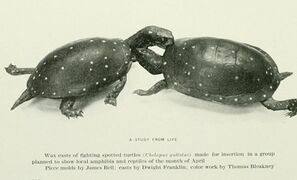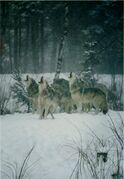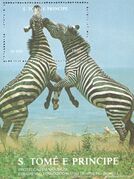Push Comes to Love



Push Comes to Love is a 1999 album by Stephen Prina released by Drag City.
Track listing
| No. | Title | Length |
|---|---|---|
| 1. | "Cums for Shove" | 3:41 |
| 2. | "The Devil, Probably" | 3:32 |
| 3. | "Too Strong" | 0:52 |
| 4. | "The Sobriquet" | 3:39 |
| 5. | "No One Calls Me Friend" | 5:49 |
| 6. | "Trevor" | 5:39 |
| 7. | "The Achiever" | 4:10 |
| 8. | "Little Lips" (A Little Tidbit, by Dr. Seuss) | 7:00 |
| 9. | "Community" | 4:48 |
| 10. | "This Is Not It" | 3:32 |
| 11. | "Hand in Glove" | 3:02 |
Background
- Recorded in 1997
- Released in 1999 by Drag City
- Listening party on March 26, 1999 in Los Angeles[1]
- Shares a name with Prina's painting series
Retrospectives
Stephen Prina, 2025[2]
I had never written a song before. But the writing of those songs was so intertwined with the recording of that album, because, if you (David Grubbs) remember, I didn’t come into it with any finished songs. I came in with musical ideas, and I travelled to Chicago to work with you and Jim O'Rourke in the recording studio, and we structured the music for all the songs. I then took all of that recorded material back to LA to develop melodies and set the lyrics to them. I had asked a variety of friends who are writers – such as Amy Gerstler and Benjamin Weissman – to write some material for me.
[...] I couldn't contact Dennis Cooper, so I just took one of his poems and got permission after the fact. [...] I sent him the recording. If I remember correctly, his response was, 'Well, I cried.' And I thought, if I made Dennis Cooper cry, that's an achievement.
Personnel
- Produced by David Grubbs and Jim O'Rourke
- Recorded by Jim O'Rourke, John McEntire, Brandon King
Cover art
Artwork and design by Barbara Bloom. It is similar to her 1997 "Color Chart" piece.
-
Color Chart, 1997
Source images
Snakes: Appears to be based on John J. Janecek's 1936 illustration from Franz Albrecht Theodor Reuss' 1930 photograph of Vipera berus mating.[3]
Zebras: Photo by Des & Jen Bartlett, National Geographic, March 1983 pg.361
Arm wrestling: Very similar to a promotional image for Sylvester Stallone's Over The Top (1987). The photo appears on posters and the cover of the novelization. Likely another take from the same shoot.
Horses: Thunderhoof and Valerie from the 1927 silent Western Wild Beauty.[4]
Birds: Photo by Steven C. Wilson, Texas 1979. Appeared in National Geographic (February 1981, pg.162-63) then Odyssey: The Art of Photography at National Geographic (1988).[5]
Turtles: The American Museum Journal (1900)[6]
Wolves (back cover): Photo "Wolf Song" by Heather Parr Fentress, Nova Scotia, Canada, 1991[7]
Zebras (back cover): Image appeared on a 1992 stamp from São Tomé and Príncipe.[8]
-
Mating dance of the Vipera berus, 1936
-
1983
-
Over The Top, 1987
-
Wild Beauty, 1927
-
Mated pair of reddish egrets in an aerial altercation, 1979
-
Wax casts of fighting spotted turtles (Chelopus guttatus), 1900
-
Wolf Song, 1991
-
Proteção da Natureza Congresso Ecologico no Rio de Janeiro (Brasil), 1992
Reviews
Spex
April 1999[9]
Hartwig Vens
Monitor
April 1999[10]
Perante os registos de David Grubbs, Archer Prewitt, Sam Prekop, Jim O'Rourke e agora Stephen Prina, curiosamente todos em nome próprio, creio ser possível afirmar que começa a revelar-se um fenómeno de recuperação da pop na sua vertente mais reconfortante. Se ela tem sido desde sempre autoproclamada pelos ingleses como sua propriedade, a verdade é que estes americanos (por acaso de Chicago) dão-lhe um sabor muito mais apetitoso. Não fosse esse apetite buscar o tempero principal à obra de Burt Bacharach, cuja influência na pop contemporânea tem crescido a olhos vistos.
Conta-se que, certo dia, estava Stephen Prina a trabalhar em mais um álbum dos Red Krayola, Jim O'Rourke e David Grubbs lhe apareceram com um desafio: compor um álbum pop. Prina, artista conceptual e músico conceituado, aceitou o desafio com entusiasmo.
Para além dos já citados O'Rourke e Grubbs, mentores dos extintos (?) Gastr Del Sol e que também assinam a produção, juntaram-se à festa mais três pesos-pesados de Chicago: o inevitável John McEntire, Sam Prekop e Rob Mazurek. A verdade é que o resultado não é nada pesado. Pelo contrário, é um conjunto de melodias deliciosas e suaves, com pequenas nuances perfeitamente enquadradas, que se acompanham com prazer do princípio ao fim. Um álbum simples e gracioso. A faceta conceptual e melancólica de Prina concentra-se nas letras. As que não foram escritas pelo próprio Prina encontraram inspiração em Benjamin Weissman, Robert Bresson, David Grubbs, Amy Gerstler, Mayo Thompson, Lynne Tillman e Dennis Cooper.
Pode não ter nada a ver (isto de gostar de música não tem nada de racional), mas a empatia que senti por «Push Comes To Love» fez-me lembrar, noutra área musical com certeza, «Signals for Tea» de Steve Beresford. São composições muito pessoais, às quais o coração não consegue resistir.
Boston Phoenix
May 14, 1999[11]
Alec Hanley Bemis
An LA conceptual artist and a member of the current Red Krayola line-up, Stephen Prina spends most of his solo debut playing intriguing word games. “Cums for, cums to/That's where he came/My modest, one-room home/He pushed it in/And then he pulled it ouch,” he sings on “Cums for Shove,” the disc’s opening track. It’s a punning narrative fragment that might be about a rape or just an extremely detached sexual encounter, and its peculiarity is heightened by Prina’s cold, lounge-singer vocals and Teletubby synths. This chilling contrast between the sterile tone of the vocals and music and the violently sensual content of the lyrics is a specialty Prina shares with Krayola’s Mayo Thompson and Gastr del Sol’s David Grubbs, though he doesn't have either's penchant for art-rock, avant-noise, and jazz flourishes. Instead, despite backing here by Grubbs and Jim O'Rourke, he relies mostly on peppy trumpets and cheesy keyboard tones.
It's also worth noting that the lyrics Prina intones with such hermetic panache are mostly the work of other people: LA spiatter-pop novelist Dennis Cooper, poet Amy Gerstler, New York fiction writer Lynne Tillman. Still, Push Comes to Love is a fascinating example of what pop music might sound like if Brian Eno and Marcel Duchamp were muses more popular than the Beatles.
Earpiece
Spring 1999[12]
b.wildered
the most immediately reference for this disk is the red krayola, due to prina's role in the drag city incarnation of mayo thompson's long-running collective. the next referent is that this was co-produced by the david grubbs and jim o'rourke, late of gastr del sol. i am only familiar with prina due to his involvement with the red krayola, but i have seen several articles mentioning him as an artist/composer, working and teaching, i believe, at the pasadena college of the arts. there is a dominant theme involving sexual/social interactions, with the cover art featuring animal pairs. this recording seems to be an exercise in collaboration, with a variety of individuals contributing and prina, grubbs and o'rourke, in various combinations, providing the musical settings. o'rourke's settings are reminiscent of his work as an arranger/producer with such artists as untitled (cynthia dahl), and edith frost, in that they are spare and appropriate, enhancing rather from distracting. i am impelled by this work to revisit my krayola cds to sniff out the prina aspects. my impression is that it is going to take awhile to sift thru this. on first few listens, it seems slight, tho perhaps this is due to my being often distracted by other activities when it is on. i definitely recommend this to those who appreciate the aforementioned nineties the red krayola, while it might be less appreciable by those who are pursuing the chicago/gastr del sol connection, due to the lack of immediately perceptible complexity, expecially in the musical side of this. those who like a diverting lyrical experience, with some whimsy involved, and with the inclination to ponder meaning, would be well served by hearing this a few times. it is definitely in my rotation, for the present time. i have found song called "trevor" to be particularly caught in my brain pan, with it's rumination on an unwashed dog's life and catchy chorus with horns part.
AllMusic
Jason Ankeny[13]
Produced by David Grubbs and Jim O'Rourke, Stephen Prina's solo debut falls somewhere between the experimental sound of latter-day Gastr del Sol efforts and classic West Coast pop. Featuring collaborations with diverse figures ranging from writers Dennis Cooper and Lynne Tillman to the Sea & Cake's John McEntire and Sam Prekop, Push Comes to Love is both smart and breezy, although it's occasionally a little too self-conscious for its own good.
Scaruffi
Piero Scaruffi[14]
Stephen Prina is a Chicago musician who grew up in Red Krayola and met all the fine minds of the city's post-rock intellighentia. They helped him out on his first solo album, but Push Comes To Love (Drag City, 1999) sounds like a kinder, lighter copy of Sam Prekop's first solo album. The guests are kept at arm's length and what prevails is a fragile pop candor.
References
- ↑ https://web.archive.org/web/19990419202412/http://www.dragcity.com/tourprina.html
- ↑ https://www.frieze.com/article/david-grubbs-stephen-prina-253
- ↑ https://archive.org/details/courtshipmatingb2022davi/page/266/mode/1up
- ↑ https://www.youtube.com/watch?v=Q4OS53t9-70
- ↑ https://archive.org/details/cor5_0_s06_ss01_boxrg5_0_2008_022_18/page/n176/mode/1up
- ↑ https://archive.org/details/americanmuseumjo11amer/page/210/mode/1up
- ↑ https://archive.org/details/motherearththrou00boic/page/73/mode/1up
- ↑ https://www.shutterstock.com/image-photo/sao-tome-principe-circa-1992-stamp-87193798
- ↑ https://archive.org/details/spex-1999-04/page/61/mode/1up
- ↑ https://archive.org/details/monitor-iii-serie-55-abril-99/page/n16/mode/1up
- ↑ https://archive.org/details/sim_boston-phoenix_may-14-20-1999_28_20/page/n95/mode/1up
- ↑ http://white-rose.net/earpiece1.html
- ↑ https://www.allmusic.com/album/push-comes-to-love-mw0000599878
- ↑ https://www.scaruffi.com/vol5/prina.html

